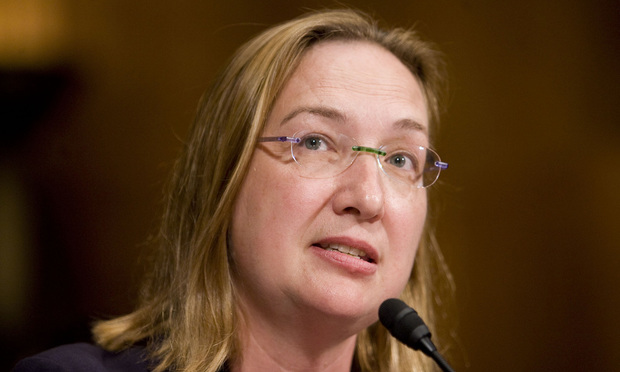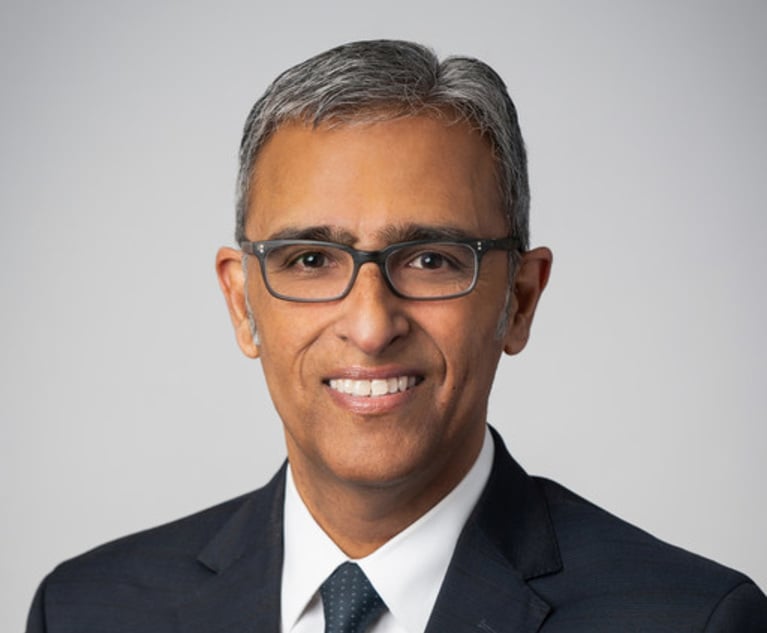What It's Like to Be Sentenced in DC's Federal Courthouse During COVID-19 Pandemic
Most proceedings at the D.C. trial court have been postponed due to the pandemic. But attorneys for one criminal defendant urged he be resentenced quickly, as it could allow him to be quickly released from federal prison.
March 25, 2020 at 05:21 PM
6 minute read
 Beryl Howell during her confirmation hearing in July 2010 to be a judge on the U.S. District Court for the District of Columbia. Credit: Diego M. Radzinschi / NLJ
Beryl Howell during her confirmation hearing in July 2010 to be a judge on the U.S. District Court for the District of Columbia. Credit: Diego M. Radzinschi / NLJ
Charles Hall's sentencing Wednesday at the U.S. District Court for the District of Columbia was supposed to happen last Friday.
But Chief Judge Beryl Howell postponed it until May under the court's COVID-19 policy, a move that sent Hall's attorneys scrambling to get him out of the federal detention center as soon as possible, citing the same pandemic that the judge invoked to delay the hearing.
Hall's attorneys, a clinic team from Georgetown Law, quickly pushed back, filing a memorandum with the court Thursday waiving their client's right to be physically present and said Hall would appear through videoconference instead. Making the matter even more urgent, they said, was the possibility that Hall could be released from the federal prison in Loretto, Pennsylvania, imminently, as he had already served much of the sentence federal prosecutors were requesting.
So when Howell opened the sentencing hearing for Hall Wednesday, the judge, the only party physically present in the courtroom, began with an explanation of the "legal dispute" over whether a federal sentence can be handed down over videoconference.
She said that ultimately, under precedent set by the U.S. Court of Appeals for the D.C. Circuit, she believed the sentencing could be held in this format. Howell then asked Hall a series of questions about whether he understood he was giving up certain rights, such as being able to assist attorneys in the questioning of any potential witnesses, by not being in the room. No witnesses appeared at the hearing, which Howell acknowledged in her question.
Hall, appearing on several screens placed throughout the courtroom, said he spoke with his attorneys over the phone "on several occasions" about waiving his right to be physically present, and that he fully understood his rights and what was happening.
Hall's case was a resentencing, as he had already been sentenced to 24 years in prison after a trial in a mortgage fraud case in 2006. He appealed his case, and the D.C. Circuit reversed one of his convictions. On another appeal, the circuit remanded the case for resentencing.
Howell, in her order setting the hearing, "highly encouraged" attorneys to attend through the phone conference. Over the phone on Wednesday, Assistant U.S. Attorney Virginia Cheatham asked the judge to resentence Hall to a minimum of 188 months.
She also asked that a number of conditions be placed on Hall's supervised release, which she suggested last for five years. Cheatham said Hall had not shown remorse during his initial sentencing in 2006, and noted that he had been convicted of felonies before facing these charges.
"I worry we will see this man again," Cheatham said.
Hall's counsel, led by Erica Hashimoto, said he had accumulated enough good time credit that he would be eligible for home confinement if sentenced to the requested 188 months. But she argued that, in light of the pandemic and the possibility that it could spread quickly through a prison population, Hall should be sentenced to time served. That would allow him to avoid some procedural hurdles that would delay his release, Hashimoto said.
Howell then asked Cheatham to weigh in, noting the "extraordinary circumstances" created by the pandemic. She said it may benefit the Bureau of Prisons to have fewer individuals in its custody during the health crisis.
Cheatham said she was only authorized to advocate for the 188-month sentence. "Personally, I understand and I am sympathetic," she added.
Hall, in delivering his allocution, directed his remarks to Cheatham. He said he understood her concerns about his lack of remorse in the past and over his multiple convictions, but said he is now a changed man.
Getting emotional at times, Hall said he has spent time in prison studying law and helping fellow inmates. He said he now wants "to dedicate the rest of my life to try to help others."
Howell said the crimes Hall was convicted of were "very serious." However, she said she could tell that Hall has made "significant strides" in the years since his original sentencing, and that he showed remorse in a letter submitted to the court.
And she sided with Hall's counsel, sentencing him to time served and three years of supervised release. But the judge warned Hall that if he should "mess up" and violate the terms of his release, she will see him back in court. "And that will be a sad day," Howell added.
The hearing was not without technical issues: Hall was twice dropped from the call, once at the start of Cheatham's remarks on his sentencing, and as Howell was preparing to hand down the sentence. The issues did not seem to stem from the D.C. court.
The court's IT staffer was not in the courtroom at the time of the issues, but was summoned both times. At the first instance, the federal prison was able to quickly reestablish the connection, and Cheatham continued on.
But the second stretch lasted for more than 20 minutes. "Sometimes this works like a charm, this is more interruptions than usual," Howell said.
Howell ordered earlier this month that most criminal and civil proceedings in the D.C. Circuit be halted, in light of the public health recommendations made to minimize the spread of the coronavirus. Only court personnel, those required to attend proceedings or members of the media are now allowed in the courthouse.
But essential court hearings are continuing on in the otherwise quiet building, largely with defendants housed at the D.C. jail or through phone conferences with counsel. Howell herself has two more hearings scheduled for Thursday.
Read more:
'It's Kind of a Mess': Phone Arguments Get Rocky Debut at DC Circuit During COVID-19 Pandemic
Tired of Netflix? Listen to Live Arguments From the 11th Circuit
'People Are Pissed': Pass/Fail Grading Controversy Roils Law Schools
California Chief Justice Suspends Trials Statewide for 60 Days
As Coronavirus Crisis Deepens, More Courts Abandon In-Person Operations
This content has been archived. It is available through our partners, LexisNexis® and Bloomberg Law.
To view this content, please continue to their sites.
Not a Lexis Subscriber?
Subscribe Now
Not a Bloomberg Law Subscriber?
Subscribe Now
NOT FOR REPRINT
© 2025 ALM Global, LLC, All Rights Reserved. Request academic re-use from www.copyright.com. All other uses, submit a request to [email protected]. For more information visit Asset & Logo Licensing.
You Might Like
View All
Weil Adds Acting Director of SEC Enforcement, Continuing Government Hiring Streak
3 minute read

Law Firms Expand Scope of Immigration Expertise Amid Blitz of Trump Orders
6 minute readTrending Stories
Who Got The Work
J. Brugh Lower of Gibbons has entered an appearance for industrial equipment supplier Devco Corporation in a pending trademark infringement lawsuit. The suit, accusing the defendant of selling knock-off Graco products, was filed Dec. 18 in New Jersey District Court by Rivkin Radler on behalf of Graco Inc. and Graco Minnesota. The case, assigned to U.S. District Judge Zahid N. Quraishi, is 3:24-cv-11294, Graco Inc. et al v. Devco Corporation.
Who Got The Work
Rebecca Maller-Stein and Kent A. Yalowitz of Arnold & Porter Kaye Scholer have entered their appearances for Hanaco Venture Capital and its executives, Lior Prosor and David Frankel, in a pending securities lawsuit. The action, filed on Dec. 24 in New York Southern District Court by Zell, Aron & Co. on behalf of Goldeneye Advisors, accuses the defendants of negligently and fraudulently managing the plaintiff's $1 million investment. The case, assigned to U.S. District Judge Vernon S. Broderick, is 1:24-cv-09918, Goldeneye Advisors, LLC v. Hanaco Venture Capital, Ltd. et al.
Who Got The Work
Attorneys from A&O Shearman has stepped in as defense counsel for Toronto-Dominion Bank and other defendants in a pending securities class action. The suit, filed Dec. 11 in New York Southern District Court by Bleichmar Fonti & Auld, accuses the defendants of concealing the bank's 'pervasive' deficiencies in regards to its compliance with the Bank Secrecy Act and the quality of its anti-money laundering controls. The case, assigned to U.S. District Judge Arun Subramanian, is 1:24-cv-09445, Gonzalez v. The Toronto-Dominion Bank et al.
Who Got The Work
Crown Castle International, a Pennsylvania company providing shared communications infrastructure, has turned to Luke D. Wolf of Gordon Rees Scully Mansukhani to fend off a pending breach-of-contract lawsuit. The court action, filed Nov. 25 in Michigan Eastern District Court by Hooper Hathaway PC on behalf of The Town Residences LLC, accuses Crown Castle of failing to transfer approximately $30,000 in utility payments from T-Mobile in breach of a roof-top lease and assignment agreement. The case, assigned to U.S. District Judge Susan K. Declercq, is 2:24-cv-13131, The Town Residences LLC v. T-Mobile US, Inc. et al.
Who Got The Work
Wilfred P. Coronato and Daniel M. Schwartz of McCarter & English have stepped in as defense counsel to Electrolux Home Products Inc. in a pending product liability lawsuit. The court action, filed Nov. 26 in New York Eastern District Court by Poulos Lopiccolo PC and Nagel Rice LLP on behalf of David Stern, alleges that the defendant's refrigerators’ drawers and shelving repeatedly break and fall apart within months after purchase. The case, assigned to U.S. District Judge Joan M. Azrack, is 2:24-cv-08204, Stern v. Electrolux Home Products, Inc.
Featured Firms
Law Offices of Gary Martin Hays & Associates, P.C.
(470) 294-1674
Law Offices of Mark E. Salomone
(857) 444-6468
Smith & Hassler
(713) 739-1250









